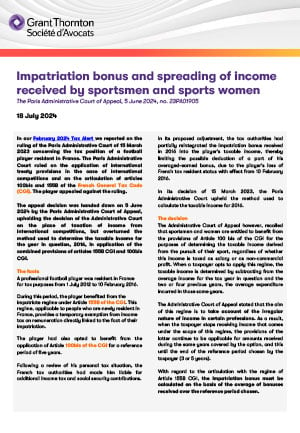In our February 2024 Tax Alert we reported on the ruling of the Paris Administrative Court of 15 March 2023 concerning the tax position of a football player resident in France. The Paris Administrative Court ruled on the application of international treaty provisions in the case of international competitions and on the articulation of articles 100bis and 155B of the French General Tax Code (CGI). The player appealed against the ruling.
The appeal decision was handed down on 5 June 2024 by the Paris Administrative Court of Appeal, upholding the decision of the Administrative Court on the place of taxation of income from international competitions, but overturned the method used to determine the taxable income for the year in question, 2016, in application of the combined provisions of articles 155B CGI and 100bis CGI.
The facts
A professional football player was resident in France for tax purposes from 1 July 2012 to 10 February 2016.
During this period, the player benefited from the impatriate regime under Article 155B of the CGI. This regime, applicable to people who are newly resident in France, provides a temporary exemption from income tax on remuneration directly linked to the fact of their impatriation.
The player had also opted to benefit from the application of Article 100bis of the CGI for a reference period of five years.
Following a review of his personal tax situation, the French tax authorities had made him liable for additional income tax and social security contributions.
In its proposed adjustment, the tax authorities had partially reintegrated the impatriation bonus received in 2016 into the player's taxable income, thereby limiting the possible deduction of a part of his averaged-earned bonus, due to the player's loss of French tax resident status with effect from 10 February 2016.
In its decision of 15 March 2023, the Paris Administrative Court upheld the method used to calculate the taxable income for 2016.
The decision
The Administrative Court of Appeal however, recalled that sportsmen and women are entitled to benefit from the provisions of Article 100 bis of the CGI for the purposes of determining the taxable income derived from the pursuit of their sport, regardless of whether this income is taxed as salary or as non-commercial profit. When a taxpayer opts to apply this regime, the taxable income is determined by subtracting from the average income for the tax year in question and the two or four previous years, the average expenditure incurred in those same years.
The Administrative Court of Appeal stated that the aim of this regime is to take account of the irregular nature of income in certain professions. As a result, when the taxpayer stops receiving income that comes under the scope of this regime, the provisions of the latter continue to be applicable for amounts received during the same years covered by the option, and this until the end of the reference period chosen by the taxpayer (3 or 5 years).
With regard to the articulation with the regime of Article 155B CGI, the impatriation bonus must be calculated on the basis of the average of bonuses received over the reference period chosen.
The Administrative Court of Appeal therefore ruled that, although the sportsman in question had ceased to be resident in France in 2016, his income for that year could be taxed on the basis of the average income received in 2016 together with the income for the four previous years, less the average amount of impatriation bonuses received in those same years.
Conclusion
The Administrative Court of Appeal decision illustrates the application of the income averaging regime set out in Articles 84 A and 100 bis of the CGI, notably in the case of professions such as sportsmen and sportswomen.
As a reminder, under this regime, taxable income is determined by deducting from the average revenue for the tax year in question together with the two or four previous years (depending on option chosen), the average expenditure for those same years. This calculation method mitigates the effects of changes in taxation and is all the more advantageous when income is irregular and significant earnings and profits are made in a given year.
The regime is applicable to professional or amateur sportspeople earning salaries or non-commercial profits (who are subject to the verified tax return rules).
The income must be derived from the actual practice of a sport. Other types of revenue (income from advertising contracts, sponsorship, etc.) are excluded from the regime. Furthermore, the activity of a sports trainer cannot be considered in the same way as that of a sportsperson (whose income is derived from the playing of a sport) and does not therefore qualify for the regime.
The method of taxation set out in Article 100 bis of the CGI is optional. Taxpayers who wish to be taxed under this regime must submit a written request for the option when filing their income tax return, specifying the reference period chosen (3 or 5 years). It is also possible to exercise this option by litigation.
The option to benefit from the regime may be expressly revoked, it will however, continue to be applied over a transitional period for the taxation of the as yet untaxed profits made during the years covered by the option.
Grant Thornton Société d’Avocats provides assistance to sportsmen and sportswomen as well clubs on any of the tax and legal aspects specific to their activity, particularly in the context of the 2024 Olympic Games in France.









